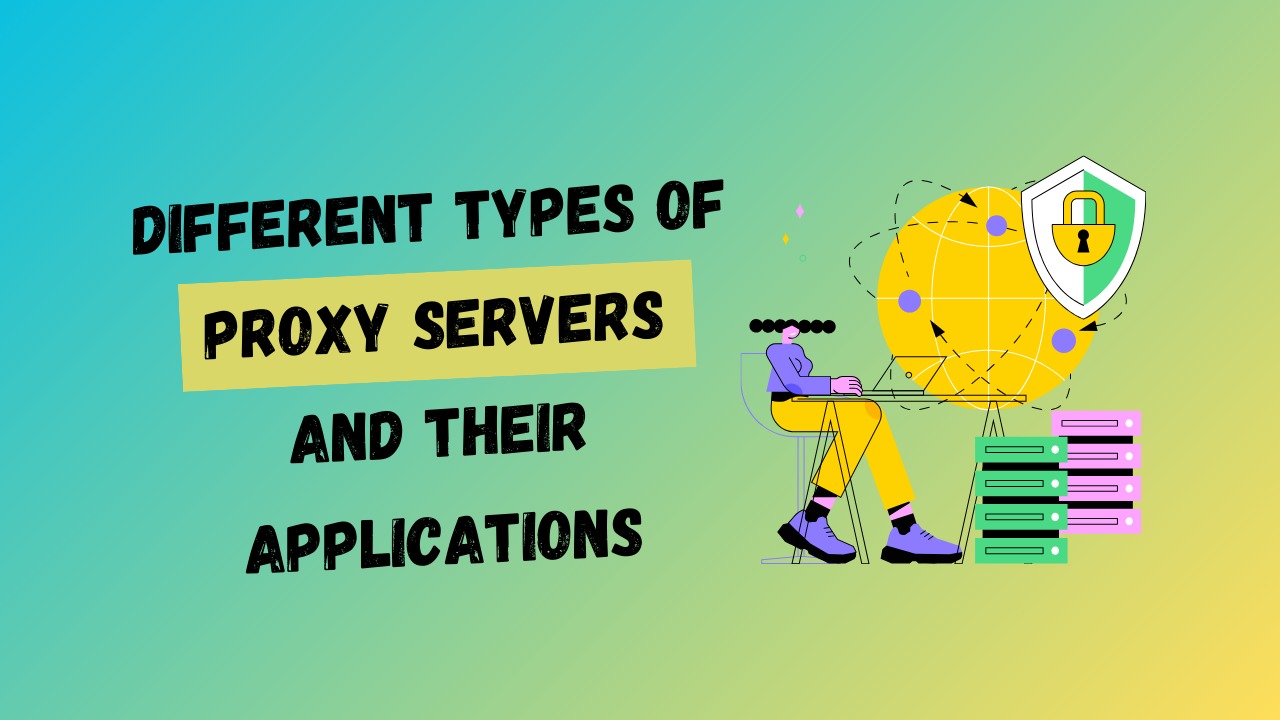Proxy servers have emerged as significant tools in today’s age of internet security and data management. With users confronted with an increasing demand for privacy, anonymity, and improved online experience, it is important to understand various types of proxy servers and where they are utilized. This guide is intended to investigate the various types of proxy servers, their uses, applications, and the particular needs they fulfill.
What are Proxy Servers?
Proxy servers are portals between the user’s computer and the internet. When a user wishes to access a website or an online service, the request initially passes through the proxy server before it reaches the site. The proxy server sends the request on behalf of the user, and when the response returns, it sends it to the user via the proxy. A proxy server is essentially a portal between the user and the internet, enabling them to communicate and manage how information flows.
Why are Proxy Servers Used?
- Improved Security: Proxy servers serve as a shield between the user and the internet, offering an added layer of security. They can protect against internet threats such as malware, phishing, and unauthorized access.
- Privacy and Anonymity: Users have the ability to browse the internet anonymously via proxy servers. By hiding their IP address, users can avoid websites and online services tracking what they do online.
- Access Control and Content Filtering: Proxy servers are used in organizations to manage who accesses what and filter content. This is necessary for maintaining a secure and productive work environment by blocking access to harmful or work-irrelevant websites.
- Bandwidth Savings: Proxy servers are able to store frequently accessed web pages and content and reuse them instead of redownloading the same data repeatedly. This results in bandwidth savings and enhanced network performance.
- Load Balancing: When there are multiple servers in an interconnected network, proxy servers can split incoming traffic equally across the servers. Load balancing accomplishes this to assist in utilizing resources and to avoid overloading a single server.
- Circumventing Geographical Blocks: Proxy servers enable users to bypass geographical blocks by some websites or internet services. Users can view content that might be censored in their area by accessing a proxy server elsewhere.
Common Proxy Risks
- Data Logging & Privacy Violations
- Some proxies, especially free ones, log user activities and sell data to third parties.
- Solution: Choose no-log proxies from reputable providers like NordVPN or Bright Data.
- Honeypot Proxies
- Malicious proxies set up by hackers to intercept and steal sensitive information.
- Solution: Always use proxies from trusted providers and avoid any unknown public proxies.
- Man-in-the-Middle (MITM) Attacks
- Attackers can modify the data between the user and the destination server.
- Solution: Use HTTPS (SSL) proxies that encrypt your data.
- IP Leaks & DNS Leaks
- Poorly configured proxies can accidentally expose your real IP.
- Solution: Use tools like IPLeak.net to test for leaks and configure WebRTC blocking in your browser.
- Slow & Unstable Connections
- Free proxies often have overloaded servers, leading to slow speeds and frequent disconnections.
- Solution: Use premium proxies optimized for speed and reliability.
Different Types of Proxy Servers and Their Applications:-
Proxy servers are of various types depending on where they are, how much traffic they can manage, their anonymity, and how they utilize IP addresses. Ensuring your internet is safe requires you to pair what you require with the appropriate type of proxy. Selecting the correct proxy is like using a personal shield, which perfectly fills what you require for a secure and seamless online experience.
Comparison Table
| Proxy Type | Anonymity Level | Speed | Best For | Tool Recommendation |
| Forward Proxy | Low | High | Content Filtering | Squid Proxy |
| Reverse Proxy | N/A | High | Load Balancing & Security | Nginx |
| Transparent Proxy | Low | Very High | Schools, Offices | ProxyCap |
| Anonymous Proxy | Medium | High | General Browsing | HideMyAss (HMA) |
| Elite Proxy | High | Medium | Secure Browsing | ProxyMesh |
| Residential Proxy | High | Medium | Scraping & Bypassing Blocks | Luminati |
| Data Center Proxy | Low | Very High | SEO & Market Research | StormProxies |
| SOCKS5 Proxy | High | High | Streaming & Gaming | NordVPN |
| Rotating Proxy | High | Variable | Web Scraping | Scraper API |
| Static Residential Proxy | High | Medium | Consistent IPs, business applications | Oxylabs, BrightData |
| Mobile Proxy | High | Low | Ad verification, social media automation | ProxyGuys, Smartproxy |
| Public Proxy | Low | Very Low | Free but unreliable browsing | Hidester, FreeProxyList |
| Private Proxy | High | High | Secure personal browsing | MyPrivateProxy |
| Shared Proxy | Medium | Low | Budget browsing, cost-saving | Proxy-Seller |
| Dedicated Proxy | High | High | Secure and private internet usage | MyPrivateProxy |
| HTTPS (SSL) Proxy | High | High | Secure encrypted traffic | Charles Proxy |
| HTTP Proxy | Low | Medium | Sneaker copping, less secure tasks | ProxyRack |
| DNS Proxy | Low | High | Faster DNS resolution, content access | Smart DNS Proxy |
| SMTP Proxy | Medium | Medium | Email security, spam protection | Proxifier |
| TOR Onion Proxy | Very High | Low | Maximum anonymity, dark web access | Tor Browser |
| SEO Proxy | High | High | SEO campaigns, web scraping | BrightData |
Understanding Proxies Based on Traffic Flow:
1. Forward Proxy – Preserving Anonymity:
A forward proxy is an intermediary between the user’s machine and the internet. It intercepts and forwards incoming traffic to the appropriate destination. It assists in concealing the user’s IP address so that they can obtain resources from public networks without exposing their identity.
Tool Recommendation: Squid Proxy Server
Squid Proxy Server, with its caching capabilities, improves speed and anonymity, making it a valuable tool for content retrieval.
2. Reverse Proxy – Optimizing Load Times:
A reverse proxy is unique in that it protects the end servers and spreads the load equally across them. Apart from load balancing, it also shields against DDoS attacks and does many other functions like caching, authentication, decryption, compression, and content enrichment.
Tool Recommendation: Nginx
Nginx, itself a powerful reverse proxy server, not only balances load across servers effectively but also performs well in functions such as caching, authentication, and content optimization, adding to the cause of faster loads.
Exploring Proxies Based on Anonymity Levels:
Level 3 Transparent Proxy – Prioritizing Speed:
This proxy prioritizes faster website retrieval and content restriction. However, it forwards the user’s IP address, compromising a degree of anonymity in favor of speed.
Alternative Tool Recommendation: ProxyCap
CCProxy, known for its transparency and speed, facilitates faster website retrieval while maintaining a degree of visibility. It is an ideal tool for scenarios where anonymity takes a back seat to speed.
Level 2 Anonymous Proxy – Balancing Anonymity and Speed:
Also known as distorting proxies, Level 2 anonymous proxies hide the user’s true IP address while revealing the use of a proxy. Despite this disclosure, they remain popular for their balance between anonymity and speed in everyday use.
Tool Recommendation: HideMyAss (HMA)
HMA, a renowned VPN service, doubles as an anonymous proxy, providing users with the perfect blend of speed and anonymity for everyday web browsing.
Level 1 Elite Proxy – Supreme Anonymity:
Elite proxies provide maximum privacy by hiding the IP address of the user and displaying that no proxy is being used. They achieve this through the removal of the ‘Via’ field in the HTTP header, thus making users become real non-proxy users.
Tool Recommendation: ProxyMesh
ProxyMesh provides a collection of high-quality proxies. It makes users extremely private by concealing both their IP addresses and the use of a proxy. The tool ensures users look the same in their online presence.
Diverse Proxies Based on IP Location:
1. Data Center Proxy – Swift and Cost-Effective:
Data center proxies derive their IPs from large server farms, ensuring speed but increasing the risk of being blocked, especially in data-intensive tasks. Despite this, they offer a cost-effective solution.
Tool Recommendation: StormProxies
StormProxies, with its reliable data center proxy services, strikes a balance between speed and effectiveness, making it suitable for quick and short tasks while minimizing the risk of being blocked.
2. Residential Proxy – Authentic Geo-Location Masking:
Residential proxies provide IPs from Internet Service Providers (ISPs), making users appear as authentic requesters. They are ideal for accessing protected web pages without the risk of IP blacklisting.
Tool Recommendation: Luminati
Luminati’s residential proxy network offers a wide array of IPs from real ISPs, making it the go-to tool for users seeking geo-location masking and access to protected web pages without the fear of IP blacklisting.
3. Mobile Proxy – Testing Mobile Experiences:
Mobile proxies are residential proxies. They employ the IP address of mobile users, so the users will appear to be accessing from a mobile device even if they are accessing from a desktop. They are employed for mobile ad, app, and other mobile product experience testing.
Tool Recommendation: ProxyGuys
ProxyGuys has been known to offer reliable mobile proxy solutions. It offers a high volume of various IPs from mobile consumers. This is a great solution for testing mobile ads, apps, and other product experiences. This guarantees that user interactions are real. With ProxyGuys, users are able to experience a seamless and real mobile experience for end-to-end development and testing.
Proxies Categorized by Protocol:
1. HTTPS (SSL) Proxy – Ensuring Cyber Security:
Proxies with SSL features are considered the most secure as they utilize Secure Sockets Layer (SSL) technology to establish encrypted links. This ensures that all data passing through is encrypted and decrypted.
Tool Recommendation: Charles Proxy
Charles Proxy, with its ability to capture and analyze HTTPS traffic, becomes an indispensable tool for ensuring cyber security. It aids in identifying and mitigating potential security threats within encrypted communication channels.
2. HTTP Proxy — Tailored for Specific Cases:
While HTTP proxies are being phased out due to their lack of security features, they still find utility in specific cases like sneaker copping, where security concerns are minimal compared to other applications.
Tool Recommendation: ProxyRack
ProxyRack, offering a diverse range of HTTP proxies, remains relevant in specific use cases like sneaker copping. Its affordability and effectiveness make it a preferred choice for scenarios where advanced security features are not the primary concern.
3. SOCKS5 Proxy — Versatile Handling:
SOCKS5 proxy servers work under HTTP(S) proxies and relay data without even viewing it. They support all forms of traffic, including gaming, streaming, and torrenting, and they support the faster UDP protocol.
Tool Recommendation: NordVPN
NordVPN has SOCKS5 proxy support, which helps in processing different kinds of traffic securely. They include gaming, streaming, and torrenting. Its UDP protocol support and strong configuration help in providing an uninterrupted experience for the users.
Proxies Designed for Specific Applications:
1. DNS Proxy – Enhancing Speed and Performance:
DNS proxies function as DNS servers and query forwarders, enhancing speed and performance. Some advanced DNS proxies even allow users to unblock websites, which is similar to VPN services.
Tool Recommendation: Smart DNS Proxy
Smart DNS Proxy not only serves as a DNS proxy but also enhances speed and performance by facilitating quick and efficient domain resolution. It is a valuable tool for users looking for improved Internet performance and unblocking capabilities.
2. SMTP Proxy – Combating Spam:
Simple Mail Transfer Protocol (SMTP) proxies act as mail transfer intermediaries, filtering any incoming and outgoing email traffic to combat spam and malware effectively.
Tool Recommendation: Proxifier
Proxifier, with its support for SMTP protocols, helps in directing email traffic through a proxy server. It acts as a reliable tool for users combating spam and malware by filtering incoming and outgoing email traffic effectively.
3. TOR Onion Proxy – Secure Browsing:
TOR Onion proxies work in conjunction with the TOR network to provide better anonymity. They hide entry TOR routes and exit nodes, ensuring complete connection point concealment.
Tool Recommendation: Tor Browser
The Tor Browser, an integral part of the Tor network, acts as an onion proxy, providing enhanced anonymity by concealing entry and exit points. It remains a staple for users seeking a secure and private internet browsing experience.
4. SEO Proxy – Anonymity for SEO Campaigns:
Utilized for bulk SEO campaigns, SEO proxies provide you with privacy, speed, and reliability. You can utilize real IP addresses for web data gathering and competitor analysis.
Tool Recommendation: Bright Data
Bright Data’s SEO proxies, designed for large-scale operations, offer anonymity, speed, and reliability. These proxies become essential for SEO campaigns requiring authentic IP addresses to navigate web scraping and competitive analysis.
Proxies Classified by Service Types:
1. Public Proxy – Balancing Accessibility and Security:
Public proxies are freely available on proxy server sites but come with drawbacks such as unreliability, slowness, and less security. The cost-free advantage is often outweighed by these cons.
Tool Recommendation: HideSter
Hidester, offering a mix of free and premium services, stands out as a reliable public proxy option. Despite the drawbacks of public proxies, Hidester strives to provide a balance between accessibility and security.
2. Private Proxy – Premium Reliability:
Private proxies provide stability, quick speeds, and protection for a monthly pay. They also have extra features, providing a premium proxy experience.
Tool Recommendation: MyPrivateProxy
MyPrivateProxy is a fast, secure, and anonymous proxy service. It has a subscription price, but the additional features make it the best choice for those who want a premium proxy experience.
3. Shared Proxy – Security with Affordability:
A shared proxy is a combination of private and public proxies, which is secure and reliable. However, the speed may be reduced since multiple users share the same IP address.
Tool Recommendation: Proxy-Seller
Proxy-Seller’s shared proxy is a less expensive solution than private proxies. The pace is slower because numerous users share the same IP address, yet the trade-off between security and price makes it a viable solution.
Proxies Based on the Rotation Mechanism:
1. Static Proxy — Consistent User Simulation:
Static proxies conceal the user’s IP address behind a single residential IP address, showing a clean visitor appearance. Access is, however, restricted to content within the proxy IP location.
Tool Recommendation: Oxylabs
Oxylabs’ static proxies behave like one individual user, so they are stable and consistent. Although you can only get access to content that is accessible in the proxy IP location, their consistency and uniqueness make them an excellent option for some situations.
2. Rotating Proxy – Continuous Anonymity:
Rotating proxies offer a global pool of IP addresses, ideal for use in web scraping activities. They offer a new IP with every new connection or a fixed amount of time thereafter, hiding your identity.
Tool Recommendation: Scraper API
Scraper API offers a rotating proxy solution with numerous IPs for web scraping. IP switching makes the users anonymous, and it is a valuable feature for users who need to gather huge volumes of data.
Step into the intricate world of proxy servers with “Different Types of Proxy Servers and Their Applications,” divided by traffic flow, levels of anonymity, IP location, protocol, application, service, and rotation, which stresses the significance of selecting the appropriate proxy type. Equipped with tool suggestions by type, users can navigate this intricate world to have a secure, efficient, and customized internet experience. From improving cyber security to assisting anonymous web scraping, proxies, with the proper tools, become invaluable partners in the ever-evolving digital world.
As consumers navigate this informed path, the deep understanding of each proxy type ensures that they become well-informed decision-makers, bolstering their online presence thereby.
Check out our other blog, “14 Best ISP proxy services in 2024” for in-depth insights into the top Internet Service Provider (ISP) proxy services available in the current year, providing comprehensive information to cater to your specific proxy requirements.
FAQs
Proxies allow businesses to collect competitor pricing, analyze trends, and monitor SEO rankings without getting blocked. Rotating residential proxies work best for web scraping.
Business proxies offer higher speeds, better security, and dedicated IPs for tasks like data scraping, market analysis, and cybersecurity. Personal proxies are mainly for browsing and streaming.
SOCKS5 and HTTPS proxies provide encryption and security, useful for penetration testing, DDoS mitigation, and secure browsing.
Yes. If using unreliable proxies, businesses risk IP bans, data exposure, and performance slowdowns. Investing in premium proxy services ensures security and efficiency.
Disclosure: This post contains some sponsored links and some affiliate links, and we may earn a commission when you click on the links at no additional cost to you.






